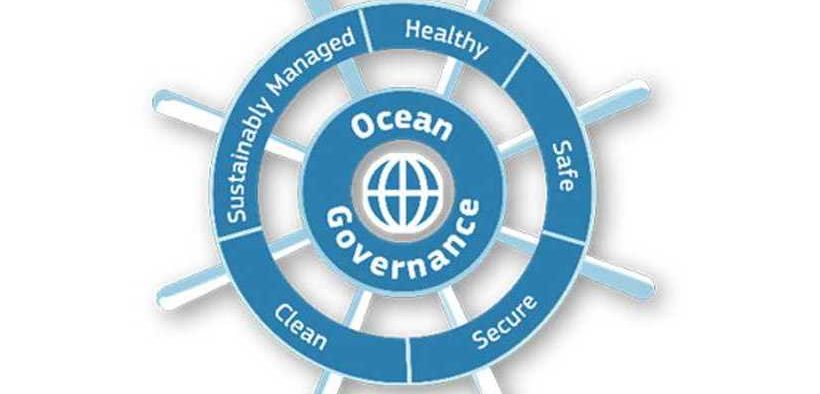This article is written by Chitra R Devi, an LLM student from Government Law College. Madhurai.
INTRODUCTION
Assuring the preservation of marine natural resources for the long term is the primary goal of ocean governance. As part of its comprehensive regulatory framework controlling oceanic activities, the United Nations Convention on the Law of the Sea (UNCLOS) divides marine space into different horizontal and vertical zones.
Essential components of ocean governance include managing the different uses of the ocean and safeguarding the marine ecosystem. One definition of ocean governance is the set of actions taken to ensure that an ecosystem continues to be healthy and productive. For ocean governance to be effective, there must be regionally coordinated efforts based on shared principles, nationally cohesive legal frameworks and policies, and internationally recognised protocols and standards.
Sustainable development goals cannot be achieved without effective global ocean governance, which goes hand in hand with marine environment management. A foundation of integrated maritime governance, including global planning, decision-making, and management procedures, is necessary for the systematic and prudent use of the World Ocean, including its marine environment and resources. Beyond land, it covers both institutional and substantive actions in the water outside of any one country’s control. Still, protecting and preserving the environment and its resources should be the top priority, not recklessly exploiting the marine ecosystem. This would presumably be doable with the establishment of a worldwide maritime administration with well-defined goals and a wide range of operations.
Having readily available funds, properly trained staff and a database that is updated on a regular basis are therefore crucial. Coastal states and territories can achieve a reasonable balance between maritime usage freedoms and environmental protection and preservation through the implementation of integrated marine environmental management. States along the coast have effective and versatile tools at their disposal to exercise their sovereign rights. In order to achieve balance, it is crucial to combine an integrated methodology with the long-standing and reliable sectoral approach to the marine environment.
OCEAN GOVERNANCE CHALLENGES
“The constitution of the oceans and seas,” as the United Nations Convention on the Law of the Sea (UNCLOS) is commonly known, stressed the importance of oceanic unity in maritime law. It was said in the convention’s preamble that “the matters concerning ocean space are intricately linked and require thorough examination.” The rules for everything that happens on or near the oceans are outlined in the UNCLOS, or the Law of the Sea Convention. A legal framework for maritime areas is outlined in the preamble of the United Nations Convention on the Law of the Sea (UNCLOS). The goal of this order is to improve communication between nations and to promote the peaceful use of the oceans and seas, the equitable and efficient extraction of their resources, the protection of living resources, and the study, safeguarding, and maintenance of the marine ecosystem.
A holistic and ecosystem-oriented approach is utilised by UNCLOS. Conservation of marine life and responsible use of maritime resources are two of the overarching goals of UNCLOS, the United Nations Convention on the Law of the Sea. As stated in Article 192 of the Convention on the Law of the Sea, the international community is obligated to safeguard and preserve the marine environment as ius cogens, demonstrating its necessity.
Climate change, natural catastrophes, environmental degradation, overfishing, biodiversity loss, and incompetent flag states are just a few of the many threats to the world’s seas and oceans. In terms of global maritime law, the UN Convention on the Law of the Sea (UNCLOS) bears paramount importance. The acidification of the oceans is a major problem that threatens the well-being of all marine life on Earth. A body of law containing suggested norms and procedures is set up by the Convention on the Law of the Sea. A political system based on this framework is possible.
There are strong reasons to implement effective measures on a global and regional scale in response to these and other risks, such as the significant increase in greenhouse gas emissions over a long period. This problem and the current need for cooperation have been recognised by the International Maritime Organisation, the European Union, and national governments. Accordingly, the development of global regulations for ship fuels is compatible with the use of LNG as a sustainable fuel for marine transportation.
OCEAN GOVERNANCE GUIDING APPROACHES
The administrative mechanisms required to set up a system of cooperation and coordination among all parties involved in ocean management will make up the institutional framework. It is crucial to consider regional and international regulations and coordination procedures in order to prevent stakeholders from being marginalised and decision-making from becoming fragmented and to encourage the implementation of an ocean governance framework. To guide or advance the system in this regard, the precautionary, holistic, and ecosystem approaches are very important.
Global ocean governance and regional maritime management are still very much in their infancy, despite the fact that ecosystem, precautionary, and holistic approaches are all acknowledged as frameworks for managing marine resources. Different agencies, each following their own set of rules and procedures, are responsible for regulating and managing different industries.
The principles of environmental law from around the world form the basis of the ecosystem approach. To ensure the sustainable use of ecosystem goods and services while concurrently maintaining the ecological integrity of the ecosystem is the goal of integrated human activity management based on the comprehension of ecosystem dynamics. Management of human activities in an integrated fashion is the definition of this approach. The establishment of no-take reserves, the implementation of efficient marine monitoring, and the protection of marine life resources that are threatened or endangered are just a few of the many consequences that this approach has for Global Ocean Governance (GOG).
To successfully avoid environmental degradation in the marine environment, the precautionary approach is crucial. The precautionary principle states that when there is a risk of significant or irreversible harm, the lack of absolute scientific certainty should not be used as an excuse to delay the implementation of measures to prevent environmental degradation. The operational challenges are associated with the planning and execution of many components that are essential to maritime policies.
MARITIME POLICY OF POLAND – ENFORCEMENT OR COMPLIANCE
The Republic of Poland’s Maritime Policy, which covers the years 2020–2030 and was approved by the Council of Ministers on March 17, 2015. The Polish government delegated the responsibility of crafting the country’s maritime policy to the Inter-Ministerial Committee on Maritime Policy. In Poland, the main government body responsible for crafting the country’s maritime policy and carrying out the EU’s Integrated Maritime Policy is the Inter-Ministerial Committee on Maritime Policy. Currently, the Prime Minister’s Inter-Ministerial Committee is being chaired by the Minister of Maritime Economy and Inland Transport, who has final say over maritime affairs. The general goals and principles of Poland’s naval policy for 2020 were approved by the Polish government in September 2009.
A policy is a well-thought-out plan of action put into motion by an organisation, whether public or private, in response to a specific set of problems. The administration’s ability to handle a variety of challenges, which must be handled well, and particular economic interests are the basic components of a national marine policy. Sustainable development is a fundamental principle that Polish maritime policy is built upon.
Effective inter-institutional coordination mechanisms must be put in place to guarantee the successful administration and realisation of Poland’s national maritime policy at the highest level of government.
Because all EU member states are required to base their national maritime policies on the “Guidelines for an Integrated Approach to Maritime Policy” and the “An Integrated Maritime Policy for the European Union,” Poland’s policy is based on these documents.
Priorities include:
- maximising maritime security and safety;
- protecting coastal areas and the marine environment;
- creating an environment conducive to knowledge-based economic development;
- using marine resources rationally;
- managing marine fisheries sustainably;
- strengthening national energy security; and
- optimising maritime governance. With an eye towards 2030, the Republic of Poland’s Maritime Policy continues to prioritise matters through 2020.
In terms of formality, Poland’s Maritime Policy is currently the most important development policy. Its efficacy depends on devoting more resources to the actual implementation of its priorities. It follows that this is a broad conclusion. What will happen with Poland’s new maritime policy is the subject of the present inquiry that needs a response.
FREEDOM OF THE SEAS
The freedom of the seas doctrine, which was initially put forth in the 17th century, has been in force for a long time. The idea was that nations could only exercise their rights and authority over the seas within a very small maritime zone that encircled their coastlines. Everyone was supposed to have equal access to the remaining seas, so nobody could claim them as their own. This situation persisted throughout the 1900s, but it wasn’t until the middle of the century that there was a push to increase national claims over offshore resources.
The impact of long-distance fishing fleets on coastal fish populations was a rising source of concern, along with the pollution and waste posed by transport vessels and oil tankers that navigated international sea routes carrying dangerous substances. Pollution has always been a potential threat to coastal areas and the marine life that lives there. There was a great deal of rivalry among the fleets of the world’s maritime powers as they sought to establish a foothold on land and at sea.
UNITED NATIONS LAW OF THE SEA CONVENTION (UNCLOS)
Peaceful, cooperative, and lawful use of the world’s seas and oceans for the benefit of all people and communities is one of the United Nations’ top priorities. The fifteen-year process began with an immediate need for an efficient international regime controlling the ocean floor and seabed outside of clearly defined national jurisdiction. This procedure led to the establishment of the UN Seabed Committee, the ratification of a treaty that forbade the use of nuclear weapons on the ocean floor, the support of the General Assembly’s proclamation that all resources found beneath the surface of the ocean, regardless of country of origin, belong to humanity as a whole, and the planning of the Stockholm Conference on the Human Environment.
When the United Nations adopted the Law of the Sea Convention in 1982, it was a major step forward in applying international law to the vast, shared aquatic resources of the planet. Concerning maritime use and sovereignty, the convention has tackled numerous important issues. Included in this category are the following: the extension of continental shelf rights up to 350 miles offshore, the creation of exclusive economic zones, the establishment of the International Seabed Authority, the delineation of territorial sea boundaries 12 miles offshore, the implementation of additional conflict resolution mechanisms, and the United Nations Commission on the Limits of the Continental Shelf.
A HISTORIC NEW MARITIME BIODIVERSITY TREATY TO PROTECT THE MARINE ENVIRONMENT
Responsible management of a nation’s water resources is a national obligation. The high seas, on the other hand, are now better protected from damaging activities like pollution and unsustainable fishing since they are not under the control of any country.
After nearly twenty years of intense negotiations, the 193 UN member states finally ratified a landmark, legally enforceable agreement on marine biodiversity on June 19, 2023. Overcoming national boundaries and encompassing two-thirds of the Earth’s oceans, this agreement sought to establish a thorough program for maritime sustainability and conservation.
When the Intergovernmental Conference on Marine Biodiversity of Areas Beyond National Jurisdiction (BBNJ) ratifies the treaty, it will be in effect and the ocean will be a shared responsibility for current and future generations. Executed in compliance with the Convention on the Law of the Sea, this treaty is known as the “high seas” treaty.
In order to ensure the responsible use, preservation, and conservation of the marine environment, this agreement is being entered into. The goal is to preserve the natural balance of ocean ecosystems while also protecting the rich variety of life forms found there.
PROTECTION OF MARINE ENVIRONMENT AND BIODIVERSITY
One of UNEP’s most visible initiatives, the Regional Seas Programme, promotes responsible use of marine resources and works to protect the world’s oceans and seas. An international agreement known as the Regional Seas Conventions and Action Plans is the only legal framework in place at the regional level to protect the oceans and seas. The Global Programme of Action to Protect the Marine Environment from Land-based Activities was established by the United Nations Environment Programme (UNEP). When it comes to addressing the interdependence of terrestrial, freshwater, coastal, and marine ecosystems, no other international framework compares.
Marine research, observation systems, risk reduction, and better coastal and oceanic region management are all areas that fall under the purview of the Intergovernmental Oceanographic Commission of UNESCO.
In 2017, the UN General Assembly formally declared the Ocean Decade, which is shorthand for the UN Decade of Ocean Science for Sustainable Development (2021–2030). In order to help this vast marine ecosystem continue to thrive into the future, this decade’s focus will be on expanding our understanding of the ocean and its science.
To attain “the science we need for the ocean we desire.” This is the principal aim of the Ocean Decade. Sea science can only progress with the help of scientists and stakeholders from all walks of life working together within this initiative’s established framework. By working together, we can better understand the ocean system and provide solutions backed by science to help reach the goals of the 2030 Agenda.
For the Decade, UNESCO’s Intergovernmental Oceanographic Commission (IOC) coordinates all the necessary planning and carrying out.
The primary UN body responsible for creating rules governing international shipping is the International Maritime Organisation (IMO). The group’s primary goal is to create a generally agreed-upon, efficient, and fair regulatory structure for the shipping industry.
MARINE SHIPPING AND POLLUTION
To reduce emissions of greenhouse gases from international shipping, the International Maritime Organisation (IMO) has mandated energy-efficiency measures and set standards to reduce air pollutant emissions from ships. The cleaner and more environmentally friendly shipping industry is the target of these initiatives. Among these accords are the International Convention for the Prevention of Pollution of the Sea by Oil, signed in 1954, and the International Convention for the Prevention of Pollution from Ships, which was signed in 1973 and amended by a Protocol in 1978 (MARPOL).
POLAR CODE
In 2017, the International Code for Ships Operating in Polar Waters—officially known as the Polar Code—was put into effect. When it comes to ships navigating the hazardous waters around the polar regions, the Polar Code covers everything that matters: design, construction, equipment, operations, training, environmental protection, search and rescue, and more. There had been a lot of regulatory progress in other areas, like environmental protection, supply chain and maritime security, and trade facilitation, but this was a major step forward in transportation regulation.
PIRACY
Off the coast of Somalia and the Gulf of Guinea, piracy incidents have recently surged. The security of trade and navigation are both jeopardised by pirate attacks, which also endanger maritime workers. Dead bodies, injured or kidnapped sailors, major navigational and commercial delays, financial losses for shipowners, higher security and insurance premiums, higher prices for consumers and producers, and a degraded marine environment are all possible outcomes of these illegal activities.
Pirate attacks can have far-reaching consequences, including the impossibility of delivering humanitarian aid and the subsequent increase in shipping costs to affected areas. To strengthen the anti-piracy rules laid out in the Law of the Sea Convention, the UN and the International Maritime Organisation (IMO) passed supplemental resolutions.
Through its Global Maritime Crime Programme (GMCP), the United Nations Office on Drugs and Crime (UNODC) is making strides in combating transnational organised crime in Africa. The fight against piracy in the Horn of Africa and the Gulf of Guinea is the stated goal of the initiative. By carrying out trials and detaining individuals suspected of piracy, the program has helped regional states. The program has also improved maritime law enforcement’s capacity to enforce the law by launching training programs. Despite facing many obstacles, the UNODC GMCP has achieved remarkable success in areas such as the piracy prosecution model, prisoner transfers, and training of judicial system members in the Atlantic and Indian Ocean regions. Somalia, Kenya, and Ghanaian coast guard and police units are also provided with full-time, thorough mentoring through the program. To achieve this goal, a number of programs were put in place with the express purpose of enhancing maritime safety and strengthening the legal systems in the designated nations.
CONCLUSIONS
More and more people are becoming aware of the fact that the oceans’ future is dependent on three things: improved scientific understanding of oceanic processes, a comprehensive and coordinated approach to ocean management, and the effective implementation of international legal frameworks regulating various ocean activities. This led to the formation of national maritime policies, the European Union’s integrated marine policy, and global ocean governance. In addition, it must be stressed that every country’s maritime policy is a part of ocean governance due to the interconnected nature of maritime policy and global ocean governance. The connection between the two ideas is thus defined.
A number of issues pertaining to ocean governance are addressed by the EU’s Integrated Maritime Policy, which promotes sustainable development principles in the maritime sector. These include, but are not limited to, the following: maritime education and knowledge dissemination, maritime spatial planning, integrated coastal zone management, maritime environmental protection, and shipping safety and security. It is essential that all actions take into account the unique characteristics of the various regional seas within the European Union (EU) and the entire ocean in order to put into practice the rules, instruments, and best practices of global ocean governance.
Step one in developing a comprehensive national maritime policy is outlining the necessary processes to be followed. Consequently, the primary goal of maritime policy should be to maximise economic and social benefits through the sustainable utilisation of coastal areas and marine resources. States must work together to achieve effective ocean governance so that maritime policies and strategies can be developed that benefit current and future generations.















